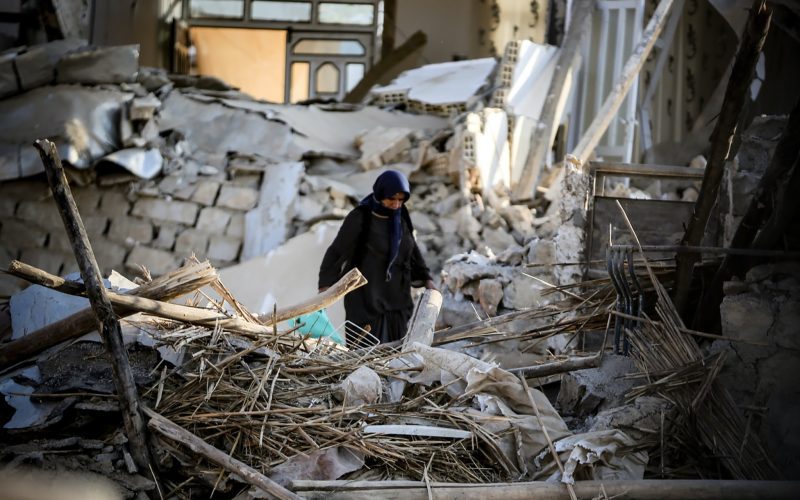If you live in an area that is prone to earthquakes, it is important to be prepared for the possibility of one occurring. Here are some things to do after an earthquake:
- Check for injuries and render aid if necessary.
- Check for damage to your home or property and make repairs as needed.
- Contact your insurance company to file a claim.
- Check with your utility companies to see if there are any power or water outages in your area.
- Stay tuned to local news reports for information on road closures, evacuation routes, and other important updates.
The Three Main Hazards Following An Earthquake
In the aftermath of an earthquake, there are three main hazards that you need to be aware of: falling debris, fires, and gas leaks.
Falling debris is the most common hazard following an earthquake. Be on the lookout for anything that could fall and injure you, such as loose bricks, glass, or pieces of furniture. If possible, stay indoors until the shaking has stopped and it is safe to go outside.
Fires are another hazard that can occur after an earthquake. If a fire starts, it can quickly spread and become out of control. Be sure to have a fire extinguisher handy in case of an emergency.
Gas leaks are also a concern after an earthquake. If you smell gas, open all the windows and doors to ventilate the area. Do not turn on any lights or appliances, as this could cause a spark and ignite the gas. If you can’t safely turn off the gas yourself, call your utility company for assistance.
How To Protect Yourself From These Hazards
If an earthquake hits, it is important to be prepared and know how to protect yourself from the many hazards that can come with it. Here are some tips on how to do just that:
- Drop to the ground as soon as you feel the quake and take cover under a sturdy piece of furniture or in a door frame. This will help protect you from falling debris.
- If you are outdoors, stay away from buildings, power lines, and trees.
- Be aware of your surroundings and watch out for things that could fall or collapse, such as walls, ceiling tiles, and furniture. Move away from them if possible.
- Stay calm and avoid panicking. This will help you think clearly and react quickly if necessary.
First Aid For Common Injuries After An Earthquake
If you find yourself injured after an earthquake, it is important to remain calm and follow these steps for first aid. If the injury is severe, call 911 immediately.
If the victim is bleeding, apply direct pressure to the wound with a clean cloth or bandage. If the bleeding is profuse, elevate the injured limb above the level of the heart.
If the victim has a broken bone, do not try to set it yourself. Instead, immobilize the affected limb with a splint or sling and seek medical attention immediately.
If the victim is suffering from shock, lay them down on their back with their feet elevated slightly. Keep them warm and comfortable until help arrives.
How To Create A Family Disaster Plan
When it comes to preparing for a disaster, it’s important to have a plan in place for your family. Here’s how to create a family disaster plan:
- Choose a meeting place. This should be a safe place where everyone can meet in the event of an emergency.
- Make sure everyone in your family knows how to get in touch with each other. If cell phone service is down, you may need to rely on other communication methods like email or social media.
- Put together an emergency kit. This should include items like food, water, first-aid supplies, and cash.
- Plan for pet care. If you have pets, make sure you have a plan in place for their care in the event of an emergency.
- Practice your plan. Once you have your plan in place, practice it with your family so everyone knows what to do in the event of an emergency.
How To Stay Safe When Returning Home After An Earthquake
If an earthquake hits while you’re away from home, there are a few things you should do to stay safe when returning. First, check for damage to your home and surrounding area. If it’s safe to do so, enter your home and survey the damage. If there is significant damage, or if you feel unsafe entering your home, evacuate immediately and go to a safe location.
Once you’ve assessed the damage to your home, contact your utility companies to let them know about any outages or damage. If gas lines are damaged, DO NOT turn on any lights or appliances in your home – this could cause a fire or explosion. Once utilities have been restored, open windows and doors to air out your home and remove any debris that may have entered during the earthquake.
Finally, be sure to check on your neighbours, especially those who may need assistance evacuating or dealing with damage. By working together, we can all get through this difficult time safely.
Conclusion
Preparing for the unknown is essential for surviving an earthquake and protecting yourself, your family, and your property. While earthquakes can be devastating, following these tips will help you stay safe during and after a disaster. These guidelines are designed to teach individuals how to prepare for potential risks associated with an earthquake in their area. Knowing what steps to take if the ground starts shaking can make all of the difference when it comes to being able to survive a natural disaster like an earthquake.











